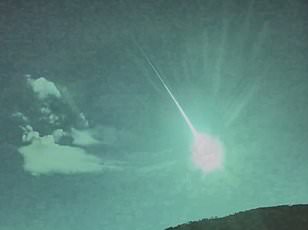Look up tonight! Perseid Meteor Shower peaks this evening with up to 100 shooting stars overhead every hour - here's the best time to see it
- The Perseid Meteor Shower is set to peak tonight - and you don't want to miss it
If you're a fan of skygazing, make sure you have this evening marked off in your calendar.
The Perseid Meteor Shower is set to peak tonight - and you don't want to miss it!
At the peak of the shower, you'll have the opportunity to see up to 100 shooting stars overhead every hour.
That makes it one of the most dramatic astronomical events of the entire year.
Here's everything you need to know about the Perseid Meteor Shower, including why it occurs and the best time to see it.

Look up! Skywatchers across the UK will be among those able to enjoy the Perseid meteor shower, which takes place when the Earth ploughs through debris left behind by the Swift-Tuttle Comet during its trips through the inner solar system

If skies are clear, the Perseid meteor shower should be visible across the UK from around midnight tonight until the early hours of August 13
If skies are clear, the Perseid meteor shower should be visible across the UK from around midnight tonight until the early hours of August 13.
The event is associated with the dusty debris left by Comet Swift-Tuttle, which orbits the sun once every 133 years.
The meteoroids from the comet, mostly no bigger than a grain of sand, burn up as they hit the Earth's atmosphere at 36 miles per second, to produce a shooting stream of light in the sky.
Peak temperatures can reach anywhere from 1,648°C to 5,537°C as they hit the atmosphere.
The meteors are called Perseids because they seem to dart out of the constellation Perseus.
Although they officially peak on the night of August 12, Daniel Brown, associate professor in astronomy at Nottingham Trent University, said it is worth keeping an eye out for a secondary peak, should it occur.
He said: 'The meteor shower slowly builds up from mid July to then reach its peak activity at 100 per hour on August 12.

Although they officially peak on the night of August 12, Daniel Brown, associate professor in astronomy at Nottingham Trent University, said it is worth keeping an eye out for a secondary peak, should it occur
'It then reduces until the mid-end of August.
'However, in reality, the activity can show more complex variation which means the peak might not be the only one.
'The years 2018 and 2020 had some increased activity a day or two after the main peak.
'So in addition to meteor showers not being a one-evening thing – slowly increasing and then decreasing over days – we might see that the most active evening might be followed by another one a day or two later.'
To make the most of the meteors, experts say observers should avoid well-lit and built-up areas and try to find unobstructed views.
Prof Brown said: 'Best time this year during the main peak is the second half of the night, that is the early hours of August 13. Find a place that is dark, away from direct light.'
He said it will take viewers up to 30 minutes to adjust to the darkness.
Prof Brown said: 'Bring along patience, and it is best to observe a big range of the sky as meteors will be visible all over.'























































































































































































































































































